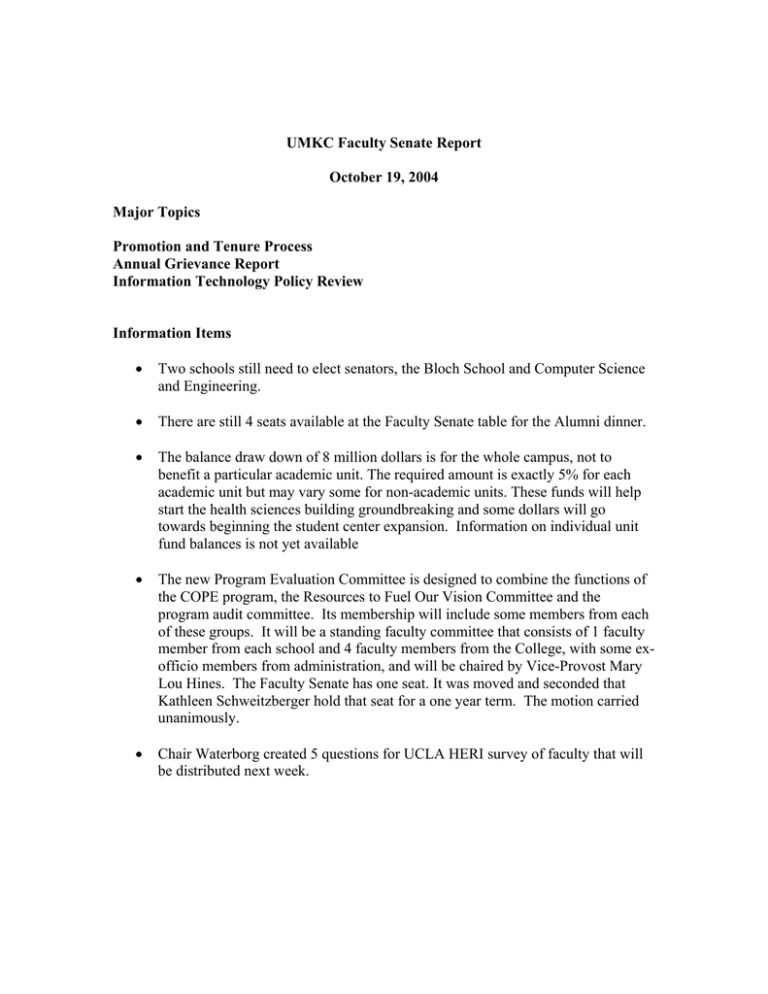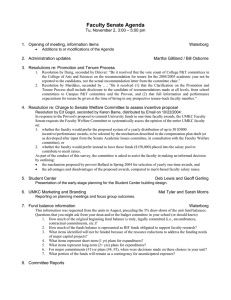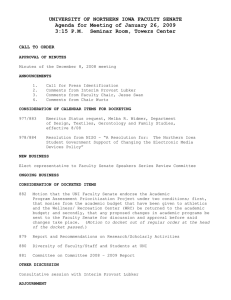Document 10855461
advertisement

UMKC Faculty Senate Report October 19, 2004 Major Topics Promotion and Tenure Process Annual Grievance Report Information Technology Policy Review Information Items • Two schools still need to elect senators, the Bloch School and Computer Science and Engineering. • There are still 4 seats available at the Faculty Senate table for the Alumni dinner. • The balance draw down of 8 million dollars is for the whole campus, not to benefit a particular academic unit. The required amount is exactly 5% for each academic unit but may vary some for non-academic units. These funds will help start the health sciences building groundbreaking and some dollars will go towards beginning the student center expansion. Information on individual unit fund balances is not yet available • The new Program Evaluation Committee is designed to combine the functions of the COPE program, the Resources to Fuel Our Vision Committee and the program audit committee. Its membership will include some members from each of these groups. It will be a standing faculty committee that consists of 1 faculty member from each school and 4 faculty members from the College, with some exofficio members from administration, and will be chaired by Vice-Provost Mary Lou Hines. The Faculty Senate has one seat. It was moved and seconded that Kathleen Schweitzberger hold that seat for a one year term. The motion carried unanimously. • Chair Waterborg created 5 questions for UCLA HERI survey of faculty that will be distributed next week. Promotion and Tenure Process Clarification In response to concerns expressed by faculty from the College Arts and Sciences, Vice Provost Jeffrey Thomas provided clarification on the promotion and tenure process as it was presented in the Report of the Roles and Rewards Task Force. Vice-Provost Thomas had reviewed the procedural changes to the promotion and tenure process at the meeting of September 27th. He has also presented these changes to the deans and other interested parties. There has been concern expressed regarding Item 3 which explains the right of candidates to respond to their review with full knowledge of the reports written by all review committee members and the dean. This recommendation from the Roles and Rewards Task Force on full disclosure is in keeping with the university system’s Collected Rules ands Regulations. The change therefore is a change in custom on our campus not a change in policy. The issue of concern in making the change in custom at this time is the fact that some promotion and tenure processes are going forward or have already been completed for this year in some academic units. The Provost however, has decided to effect the change now. The change in process is meant to aid the candidates even though it is recognized that it does cause some discomfort for faculty members serving on the review committees. This change does however make our protocols consistent with our values. Full disclosure does not apply to the confidentially of the external reviewers. There was a discussion about the selection of peer reviewers who are often chosen from larger institutions that have different research cultures. The external reviewers are no longer asked if the candidate would be awarded tenure at their home institution. There was also discussion of the full disclosure to all participants in the promotion and tenure process, of the reports of the Provost and Chancellor, who already disclose to the candidate. Transparency of the process needs to go all the way to the top in terms of the candidate and all persons involved in making decisions knowing the view of the Provost and Chancellor. The candidates’ right to privacy needs to be considered. There does need to be feedback to the units and departments on how they support and assess candidates coming up for tenure. The point was made that, for this year, all unit level chairs which might have made reference to external reviewers by name in their letters, were given the chance to revise the letters to protect the confidentiality of the external reviewers yet still allow the candidate to see the full report. There was discussion of the membership on the Roles and Rewards Task Force. The following persons served on the Task Force: Phillip Feil, Laura Gayle Green, Jerry Jean, John Killip, Gayle Levy, Patricia Marken, Nancy Mills, William Osborne, Randall Pembrook, Sully Read, Dianne Smith, Ellen Suni, Linda Gill Taylor, Jeff Thomas, and Karen Vorst. Vice Provost Thomas explained that there was no dissension over the procedural issues but a great deal of dissension over the content/criteria issues that arose as the Task Force deliberated. The procedural changes to the promotion and tenure process are in reality clarifications of existing rules. The disclosure of the vote count is an interpretation of the rule from the CRR that does not indicate whether the vote count should or should not be disclosed. The point was made that some of the academic units are in agreement with the procedural changes and are acting on them. There is some concern about allowing the College of Arts and Sciences to be exempt from effecting the changes. Vice Provost Thomas reminded Senate that he did tell us at the Senate meeting of September 27th that he did not see the procedural issues as controversial and he was going to proceed with implementing them. He agrees that the content issues are controversial and will be discussed over the coming year. These procedural clarifications being discussed fill in some gaps in Memorandum #35 which is vague about procedures. Vice Provost Thomas indicated he did try to get feedback on the procedural issues from deans and people involved in the promotion and tenure process on campus and he considered that he perhaps should have done more. He reminded the Senate that candidates for promotion and tenure who get negative recommendations get information but the candidates getting moderate to strongly positive recommendations are being left uninformed about the reasons from their review. It is this unfairness that the clarifications are seeking to address. The discussion continued on the point that the campus level committee has no standards or guidelines on which to operate, has a changing membership, and yet has enormous power. The campus level committee is removed from contact with the candidate and only makes recommendations and serves as advisory to Provost in the review process. Vice Provost Thomas said the effect of the campus level committee is related to the power of the Provost in promotion and tenure matters that has grown recently thereby making the role of the campus committee more advisory. Two senators who have recently been through the promotion and tenure review process supported the need for full disclosure from the candidate’s perspective. There was some discussion about what candidates are told about the promotion and tenure process when they interview. Currently newly hired faculty get a copy of Memorandum #35 and relevant sections of the Collected Rules and Regulations. Most new hires are not given a clear sense of expectations for promotion and tenure. The point was made again that full disclosure compromises the freedom of review committee members to be honest. The following two resolutions were made: Resolved, that for this academic year, in the College of Arts and Sciences, the vote count on tenure will not be reported to the candidates nor will the actual letter from the committee chair. Seconded. Resolved, that the clarification in the disclosure to candidate include all levels from unit committee to Provost, and that full information be given at the time of hiring. Seconded. These resolutions will be acted on at the next meeting. Annual Grievance Report The Faculty Senate is responsible for seeing that the grievance process goes forward in a timely manner. Lise Koenig shared a one-page handout that showed the grievances processed in the last two years. Only five have been filed, four have been settled and one is still in process. Over the last two years, grievances have not moved as swiftly as they should have but there is a commitment to expedite them in the future. Grievances take more or less time depending on the complexity of the grievance. Information Technology Policy Review Chair Waterborg offered a proposal to create an ad hoc senate committee, charged with developing a log-on privacy statement and a clear policy for our campus regarding privacy issues. Ralph Caruso has asked that a member of his staff and someone from general counsel be included on the committee. Chair Waterborg recommended as committee members, Gary Ebersole, Robert Popper, Forest Weddle, and Justin Malyn, as well as some members of the current Faculty Senate. Chair Waterborg asked if the Senate approved the ad hoc committee. A motion to establish the committee was made, seconded and carried unanimously. The Chair asked for senators who would serve on the committee or for nominations of others. The committee will meet within the next few weeks. The Chair asked if the Senate agreed that we should recommend to Provost Osborne that he raise this issue of employee privacy rights with Provosts on the other campuses? The Senate gave general consent for this. Committee Reports Academic Issues –The committee will develop guidelines and application procedures for the one- time faculty awards. The committee will have a preliminary discussion then will ask for input from all faculty members. The question was asked whether or not some committee should determine whether the faculty wants the one-time award or prefer some other use of the money. The committee will draft a resolution on this issue to be presented to the Senate at the next meeting. Our campus will be participating in NSSE, and we can create questions for the survey specific to UMKC. The committee will meet with Bibi Chronwall and Steve La Nasa to generate those questions. There was discussion that NSSE will be used for the student satisfaction measure in the Budgeting for Excellence proposal and we need to know exactly what information it measures and provides. Administrative Issues- The IFC election ballots went out with a double envelope voting system. The voting deadline is 5:00PM Friday, October 29th. Faculty Welfare- The Committee will present a statement on working conditions of parttime faculty some time during the next semester. Budget Committee – no report Intercampus Faculty Council - At the last IFC meeting President Floyd was asked to give his position on the formal evaluation on Chancellors. The President explained that he is developing a new evaluation instrument related to strategic choices. Our evaluation of Chancellor Gilliland will not be part of his formal evaluation but he will take it into consideration. In regard to the use of future new monies President Floyd informed the IFC that he will put at least part of all future monies into strategic choices like endowed chairs, and student financial aid. The President wants Chancellors to put forward proposals in line with the strategic choices for each campus. The resolution forwarded to the Chancellor on her reasons for the proposed reorganization has received no response yet. Senators Present: J. Waterborg, D. Murphy, K. Loncar, S. Driever, T. Luppino, O. Igwe, K. Ballou, S. Neau, K. Mitchell,E. Gogol, T. Mardikes, S. Dilks, T. Cole, C. Rice, J. Durig, O. Ukpokodu, K. Schweitzberger, J. Ragsdale, R. Gardner, K. Bame, S. McAninch, T. Stein Excused: S. Thompson, J. Snell, C. Taratino, L.G.Green Adjournment Submitted by Kathryn Loncar, Secretary UMKC Faculty Senate Addendum to Report - Senator Ed Gogol The “balance draw down” reported by the Provost may require an explanation for the benefit of faculty who have not been otherwise informed of this administrative decision. The UM system dictates that each campus hold 5% of its operating budget in reserve to the end of each fiscal year, in case of a state recall of some funds allocated to the university. UMKC practice has been for each unit, academic and administrative, to be responsible for its own reserve, if the funds are not recalled, they remain with the unit to be spent as originally budgeted, or otherwise needed, or put toward the next year’s reserve. The UMKC administration has decided to centralize the mandated 5% reserve ($8M) removing it from the individual units and putting it permanently under central administrative control. The reserve will be collected by effecting an immediate 5% decrease in the current operating budgets of each unit, on average. One of the major proposed uses of this reserve is building projects. In some cases, such as the health sciences building, this use is explained as a “loan” to the building fund, until private donations can be collected; in others, such as the Student Center project, it would be a contribution, presumably to be replaced in the mandated reserve by as-yet unspecified UMKC funds in the future.

